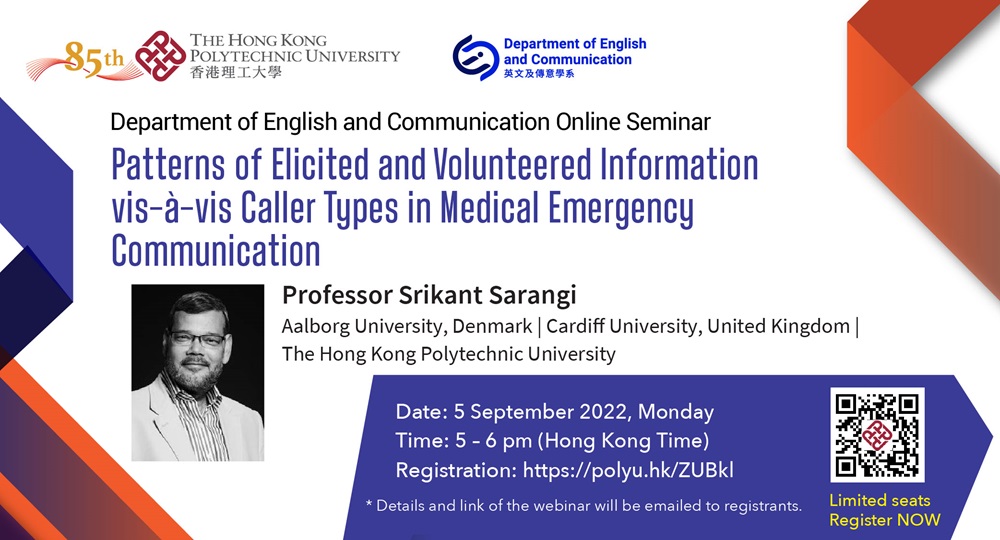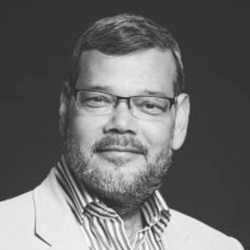Seminar I Patterns of Elicited and Volunteered Information vis-à-vis Caller Types in Medical Emergency Communication
Seminars / Lectures / Workshops

-
Date
05 Sep 2022
-
Organiser
Department of English and Communication
-
Time
17:00 - 18:00
-
Venue
Zoom
Speaker
Professor Srikant Sarangi
Summary
Medical emergency calls are interactionally and thematically organised through question-answer sequences. The callers can be patients themselves, but in most cases the calls are made on behalf of patients, e.g., partners/spouses, children/sibling, professional carers and even strangers. This presentation is premised on the basic assumption that the caller profile is a key variable in how the communication process is mediated, irrespective of the algorithmic script guiding such calls.
The main data corpus consists of 400 calls made to the emergency number (112) concerning breathlessness, directed at two Medical Emergency Services located in the Capital Region and Northern Denmark. For the present paper, I select a representative sample of 60 calls for in-depth comparative analysis: 20 calls where the callers are patients; 20 calls where the callers are spouses/partners contacting from a home setting; and 20 calls where the callers are healthcare professionals contacting the emergency number on behalf of elderly patients resident in nursing homes.
Using theme-oriented activity analysis as the analytical framework, the findings indicate different interactional patterns of elicited and volunteered information at two phases of the call: the problem presentation phase and the detailing of medical condition phase. More specifically, there emerges a kind of gradation of elicitation by the call taker when it involves family members mediating the call – moving from directing questions at the caller to asking the caller to direct questions at the patient to expressing the intention to directly speak with/listen to the patient. This pattern deviates starkly when it involves patients and healthcare professionals as caller-types, given the direct accessibility of symptoms in the case of the former and the abundance of volunteered information in the case of the latter. In essence, during the emergency medical calls, the call taker handles not only ‘factual’ information in an algorithmic, scripted manner against established criteria but also the caller type as part of the emergent communicative contingencies. I suggest that such findings have practical relevance for call handlers and can constitute a core part of in-service communication training packages.
Keynote Speaker

Professor Srikant Sarangi
Aalborg University, Denmark | Cardiff University, United Kingdom | The Hong Kong Polytechnic University
Srikant Sarangi has been Professor in Humanities and Medicine and Director of the Danish Institute of Humanities and Medicine (DIHM) between 2013 and 2021 at Aalborg University, Denmark (www.dihm.aau.dk), where he continues as Adjunct Professor. Between 1993 and 2013, he was Professor in Language and Communication and Director of the Health Communication Research Centre at Cardiff University (UK), where he continues as Emeritus Professor. During 2022-2023, he is Visiting Chair Professor at the Hong Kong Polytechnic University. In recent years, he has been Adjunct Professor at Norwegian University of Science and Technology (NTNU), Norway (2017-2021); Visiting Professor at University of Jyväskylä, Finland (2017-2020); Visiting Professor at the College of Medicine, Qatar University (2017-2020); Visiting Professor under the Academic Icon scheme at University of Malay, Malaysia (2013-2015); Visiting Research Professor, Centre for the Humanities and Medicine, The University of Hong Kong (2013-2016); Adjunct Professor at NTNU, Norway (2009-2013); and Honorary Professor at Aalborg University, Denmark (2009-2014).
In 2012, he was awarded the title of ‘Fellow’ by the Academy of Social Sciences, UK. In 2015, he was elected as a ‘Foreign Member’ of The Finnish Society of Sciences and Letters (Societas Scientiarum Fennica). He is author and editor of twelve books, guest-editor of ten journal special issues and has published more than 250 journal articles and book chapters in leading journals. In addition, he has presented more than 1200 papers (including plenaries, keynotes, masterclasses and workshops) at international conferences and other forums. Since 1998 he is the editor of TEXT & TALK: An Interdisciplinary Journal of Language, Discourse and Communication Studies (formerly TEXT) as well as the founding editor, since 2004, of both Communication & Medicine and Journal of Applied Linguistics and Professional Practice (formerly Journal of Applied Linguistics). He is also general editor of the book series Studies in Communication in Organisations and Professions (SCOPE). He serves as an editorial board member for other journals and book series[es], and as a consulting advisor at many national and international levels.



